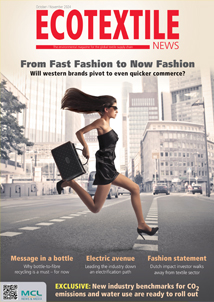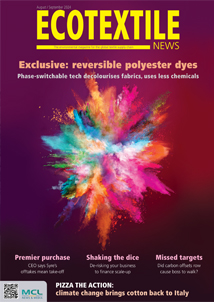YORK – Season’s greetings to all our readers. It’s that time of the year again when we look back on some of the more memorable stories from over the last 12 months in our review of the year.
Back in January, one of our more popular stories was an examination of regenerative agriculture by our cotton expert Simon Ferrigno who argued that – regardless of the hype – local solutions were paramount.
In February, we had an exclusive preview of a new report from world-leading expert Adrian Zenz who claimed China was continuing to increase its use of forced labour to subjugate Uyghur Muslims in the country's cotton hub, the Xinjiang region
March saw news that the Science Based Targets initiative (SBTi) had scrapped the net zero commitments of more than 40 fashion brands and retailers because of unrealistic scope 3 reduction targets.
In April, our correspondent Lavinia Muth visited Chile to report on the world’s biggest mountain of fashion waste in the Atacama Desert - and came away with a different perspective.
Our most read story in May concerned a report from Swiss human rights NGO Public Eye which claimed that garment workers at factories which supply ultra fast fashion giant Shein were working 75-hour weeks.
June brought better news for Swedish textile recycling pioneer Renewcell which, after filing for bankruptcy earlier in the year, announced it had been rescued by new owners who planned to continue the business under a new name.
Our most popular story of the year came in July with a UN report which said low-cost synthetic fibres and trade liberalisation were enabling the export of too much poor quality used clothing to countries with low-wage labour.
In August, we reported on a Dutch impact investor, which manages assets worth around €4.2 billion ($4.7bn), which announced it was divesting from the fashion industry due to sustainability concerns.
In September, we revealed that the Apparel Impact Institute and ZDHC were working on benchmark guidelines for both CO2 emissions and water use in garment and textile manufacturing facilities which it was hoped would become ‘de facto’ standards.
October brought landmark legislation from the US state of California which approved ‘Senate Bill 253’ requiring all companies with annual revenues of over $1 billion to disclose their global CO2 emissions, including scope 3.
In November, Fast Retailing's chief executive Tadashi Yanai sparked controversy by reportedly saying that the company did not use cotton from Xinjiang where Uyghur Muslims are allegedly used as forced labour.
Which brings us to December when human rights campaigners claimed that human rights risks remained high in Uzbekistan’s cotton industry despite the abolition of state-imposed forced labour.
So that wraps up our review – other than to thank our readers, sponsors, partners and advertisers for their continued support in our efforts to bring meaningful, independent commentary on environmental and social issues in our industry.
We will hopefully see you all in the New Year for more news, features and opinion. If you are not a regular reader, but wish to subscribe to access all our content on our website, app and print magazine, you can do so HERE.
Meanwhile, best wishes to everyone for a healthy, peaceful and prosperous 2025.












































